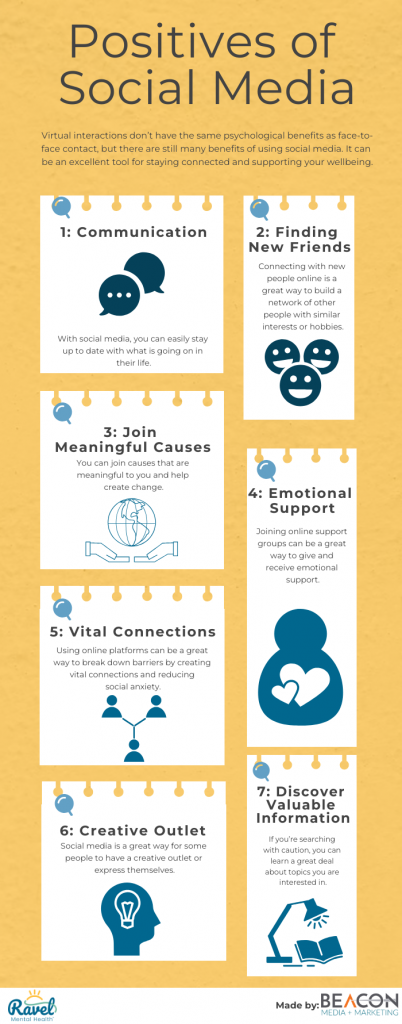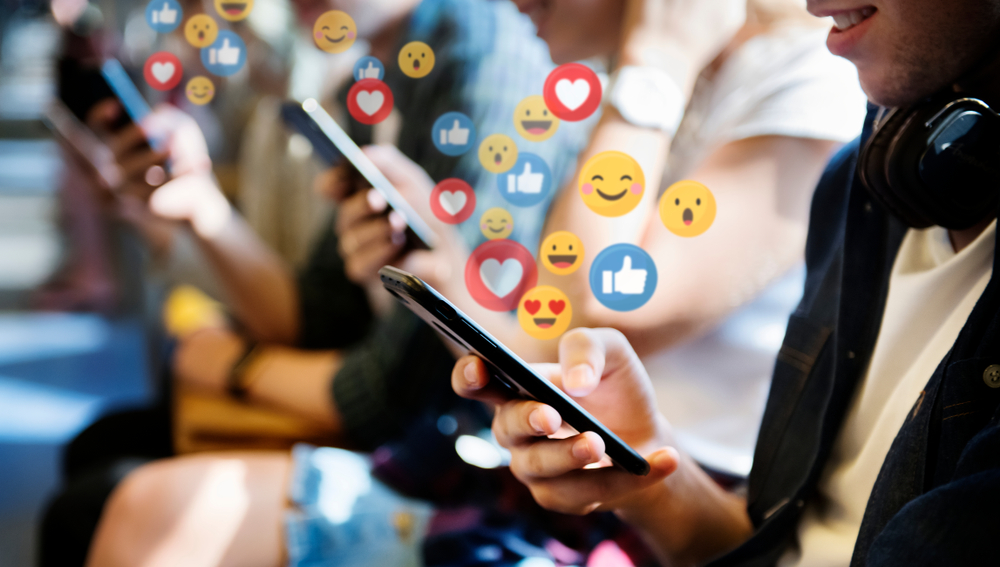Social media has become an integral part of our society. People use it to connect with friends or family and build their businesses. The main objective is to connect with people.
However, as more time has passed, social media has seemed to have varying effects on our mental health. There are both positives and negatives to being online. Some people focus on the negative consequences, but that can be managed with the proper balance of being online.
So, is social media bad for our mental health? Here are the positives and negatives of being online and how therapists can help patients who may be seeing the adverse effects of social media.
Want to connect with new clients? Sign up for Ravel Mental Health today!
How Does Social Media Affect the Brain?
Many people who use social media may feel addicted to it at times. This is because of the reinforcing physical habit of being on social media.
Using it activates the brain’s reward system by releasing dopamine, or the “feel-good chemical.” Dopamine is linked to feelings of pleasurable activities such as food, social interaction, and sex. Social media platforms are designed to be addictive.
According to a Pew Research Center, nearly 69% of U.S. adults are social media users. But the young adults ages 18 to 29 years old hit a staggering 86%. This puts a large population at risk for the positive and negative effects of social media.
The addictive tendencies are driven by the reactions we get online. For example, someone may want to boost their self-confidence, so they will post on social media. The positive responses that they receive give them a dopamine rush that will reinforce them to do it again in the future when they have self-doubt.
While it’s great that social media can provide people with a way to connect with others, that can sometimes lead to anxiety, depression, and other negative feelings that can affect your overall health.

What Are the Benefits of Social Media?
So why stay on social media? Virtual interactions don’t have the same psychological benefits as face-to-face contact, but there are still many benefits of using social media. It can be an excellent tool for staying connected and supporting your wellbeing.
Communication
Communicating with your friends and family can sometimes be taxing. With social media, you can easily stay up to date with what is going on in their life.
Finding New Friends
With so many people on social media, it is a great place to find new friends. Connecting with new people online is a great way to build a network of other people with similar interests or hobbies.
Joining Meaningful Causes
The internet has been an excellent place for people’s stories to be heard. When tragedy strikes, many people use social media platforms to build and promote awareness. You can join causes that are meaningful to you and help create change.
Emotional Support
Finding people online can be a great place to find support in times of need. Joining online support groups can be a great way to give and receive emotional support.
Vital Connections
Many people can find support or other people in the same situation if they have limited independence, social anxiety, or are part of a marginalized group. Using online platforms can be a great way to break down barriers.
Creative Outlet
Social media is a great way for some people to have a creative outlet or express themselves. Some people may use their social media posts to show the world who they are, whether that is casual posts or professional photography. People can also use social media to promote their artistic work, such as paintings, stickers, crafts, and more.
Discover Valuable Information
Although many people are talking about misinformation online, it can still be a great place to find valuable information. If you’re searching with caution, you can learn a great deal about topics you are interested in.
Want to help others use social media positively? Sign up for Ravel Mental Health today!
What Are the Negatives of Social Media?
Since it’s a relatively new technology, there is little research to establish the long-term effects of social media use. However, multiple studies provide strong links between heavy social media use and increased risk of depression, anxiety, loneliness, self-harm, and suicidal thoughts.
Comparison
Many people will craft how they are viewed online through their social media posts. This can be done by posting about fun experiences or even adjusting how they look in their photos to “look better.” This can cause people to compare themselves to others.
Most people will only post the highlights of their life and won’t post about their low points. This can lead to feelings of envy and dissatisfaction when scrolling through a friend’s filtered photos of a tropical beach holiday.
The Fear of Missing Out (FOMO)
While FOMO has been around for a long time, this is exacerbated by social media. Many people feel like they are missing out on certain things, which can impact their self-esteem, trigger anxiety, and fuel even more significant social media use.
FOMO can lead people to compare their lives to others and devalue their own life experiences. Some people may also feel like they’re missing out on conversations that are happening online and become compulsive to check social media more for new updates and prioritize their social media interaction over real-world relationships.
Depression and Anxiety
Human beings need face-to-face interactions to be mentally healthy. Having eye-to-eye contact with someone who cares about you can reduce stress and boost your mood faster. The more people prioritize social media interactions over in-person relationships, the more at risk for developing exacerbated mood disorders such as anxiety and depression.
The feelings that come from comparison or FOMO can lead to one being anxious and depressed. People can maybe see something they want and what others have and feel saddened by that being an unfulfilled portion of their lives.
Cyberbullying
Bullying has taken on a new form as social media has taken over our lives. About 36.5 percent of teens report being bullied on social media, and many other users witness offensive comments. Social media platforms can sometimes be a hotspot for spreading hurtful rumors, lies, and abuse that leave lasting emotional scars.
While kids were bullied before social media at school, these online platforms have guaranteed a way for bullying to follow kids home from school and stay with them 24/7.
Signs of Negative Social Media Use
Like everything else in life, social media usage can be good in moderation. The benefits of connection and expressing yourself can overcome the negative side effects. However, people must recognize the signs of when it’s negatively impacting their life.
One study looked at how people thought they would feel after going on Facebook and how they actually felt afterward. The study suggested that people almost always felt worse after using it compared to participating in other activities.
A few ways to identify too much social media usage are:
- Feeling increased anxiety, depression, or loneliness
- Spending more time on social media than with friends and family
- Comparing yourself with others or frequently feeling jealous
- Being cyberbullied online
- Engaging in risky behaviors or outrageous photos to gain likes and comments
- Noticing that your school, work, and relationships are suffering
- De-prioritizing self-care (such as exercise or sleep)
Changing to Positively Using Social Media
A 2018 University of Pennsylvania study examined 143 undergraduates randomly assigned to two groups. One group had to limit their Facebook, Instagram, and Snapchat to ten minutes per platform per day. The second group continued their social media usage as usual for three weeks. The limited group showed significant reductions in feelings of loneliness and depression during those three weeks over the group that continued using social media.
It’s essential to recognize the reason for extensive social media use. It may be the dopamine rush you receive from likes and comments or feeling like you’re not in a FOMO situation. Whatever it is, understanding why you’re using it can be a great way to limit your social media usage.
A few ways to help curve significant social media use are:
- Use an app to track how much time you spend on social media each day
- Turn off your phone at certain times of the day
- Don’t bring your phone or tablet to bed
- Disable social media notifications
- Remove the social media apps from your phone
Taking these small steps can help you move away from spending too much time online. You can then spend more time with friends and family in real life and recognize the value of being active offline.
How Therapists Can Help
Therapists can play a significant role in helping someone identify when social media is negatively impacting their life. You can help them feel motivated to change their social media usage and show them the mental progress that they are making as time goes on.
Ravel Mental Health can help you reach these clients in need. We work towards easily providing clients with a way to find their mental health professional. Clients can look at your availability through our website and use our online platform to schedule an appointment themselves.
You can accept their booking with one click, making it easy for everyone. While we focus on getting you new clients, you can help them make a positive change in their life.
Ravel Mental Health will help you connect with patients who may need help with social media addiction. You can help them find their way to a better and happier life.
We can help fight the negative effects of social media together.Sign up for Ravel Mental Health today!
